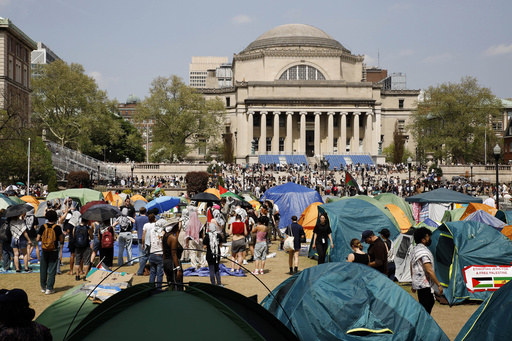
As students are getting ready to return to college campuses across the United States, there is anticipation for a resurgence in activism against the war in Gaza. Some schools are implementing rules to control the type of protests that surged on campuses during the previous spring.
Although the summer break offered a break in student demonstrations concerning the Israel-Hamas war, it also allowed student protesters and university officials time to regroup and plan for the upcoming fall semester. The situation remains tense, especially at Columbia University in New York, where President Minouche Shafik stepped down following scrutiny of her handling of demonstrations. The resignation coincided with three deans leaving after reportedly exchanging disparaging messages during a discussion on Jewish life and antisemitism on campus.
Various universities have introduced new regulations such as prohibiting encampments, limiting protest duration, designating specific areas for protests, and restricting campus entry to individuals with university identification. Critics argue that some of these measures could inhibit freedom of speech.
At Harvard University, there were discussions over potential restrictions on activities like overnight camping, chalk messages, and unauthorized signage, according to a draft document obtained by the student newspaper over the summer.
Many U.S. student activists are committed to continuing their advocacy work, which has been fueled by the increasing death toll in Gaza, surpassing 40,000 on Thursday, according to the territory’s Health Ministry. Expectations are high for protests, potentially including encampments, to resume in the fall at places like Columbia University.
Mahmoud Khalil, a lead negotiator for Columbia student protesters, expressed confidence that activism will persist on campus against Israeli policies. He mentioned that around 50 students are still facing disciplinary actions from the previous spring’s demonstrations, with mediation efforts earlier in the summer stalling.
Columbia University faced disruptions from student protests earlier this year, resulting in clashes with police and campus-wide arrests. Some students who were arrested in these actions have had their charges dropped, while others await prosecutorial decisions that may impact their academic standing.
Shafik, who announced her resignation ahead of the new semester, was under scrutiny, especially for her response to accusations of antisemitism on campus. Columbia University is now restricting access to campus to registered individuals with valid IDs to preempt any potential disruptions as classes commence.
Amidst the ongoing challenges, Columbia’s Board of Trustees appointed Katrina Armstrong as the interim president following Shafik’s resignation. The wave of student protests against Israeli policies spread to campuses nationwide after student encampments were dismantled at Columbia, leading to calls for divestment from Israel and related companies.
Despite a relatively quiet campus over the summer, revelations in June about unprofessional text exchanges between administrators during a panel discussion raised concerns. Officials involved were relieved of their positions, with Shafik acknowledging the inappropriateness of the messages which touched on antisemitic themes.
Shafik’s critics celebrated her departure, marking one of the shortest tenures in the school’s history. With recent resignations of other Ivy League leaders such as the University of Pennsylvania President Liz Magill and Harvard University President Claudine Gay, the academic landscape continues to be influenced by responses to campus protests and related controversies.
